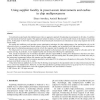Free Online Productivity Tools
i2Speak
i2Symbol
i2OCR
iTex2Img
iWeb2Print
iWeb2Shot
i2Type
iPdf2Split
iPdf2Merge
i2Bopomofo
i2Arabic
i2Style
i2Image
i2PDF
iLatex2Rtf
Sci2ools
JSA
2008
2008
Using supplier locality in power-aware interconnects and caches in chip multiprocessors
Conventional snoopy-based chip multiprocessors take an aggressive approach broadcasting snoop requests to all nodes. In addition each node checks all received requests. This approach reduces the latency of cache to cache transfer misses at the expense of increasing power. In this paper we show that a large portion of interconnect/cache transactions are redundant as many snoop requests miss in the remote nodes. We exploit this inefficiency and introduce power optimization techniques for chip multiprocessors. Our optimizations rely on the observation that in a snoopy-based shared memory system the data supplier can be predicted with high accuracy. Our optimizations reduce power by eliminating unnecessary activity at both the requester and the supplier end of snoop requests. We reduce power as we (a) avoid broadcasting snoop requests to all processors and (b) avoid tag lookup for all nodes and for all requests arriving. In particular, we use supplier locality and introduce the following ...
| Added | 13 Dec 2010 |
| Updated | 13 Dec 2010 |
| Type | Journal |
| Year | 2008 |
| Where | JSA |
| Authors | Ehsan Atoofian, Amirali Baniasadi |
Comments (0)

